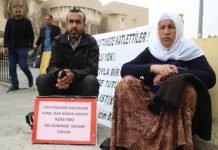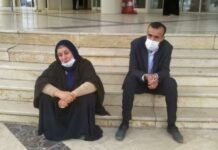Turkish police on Thursday detained a woman and her son who have been protesting in front of the Şanlıurfa Courthouse in southeastern Turkey in an attempt to seek justice for three members of their family who were killed by the relatives and bodyguards of a lawmaker from the ruling Justice and Development Party (AKP), Turkish Minute reported, citing the Mezopotamya news agency.
Both Emine Şenyaşar and Ferit Şenyaşar were taken into police custody and their placards were seized after they were visited by members of the pro-Kurdish Democratic Society Congress (DTK) and Democratic Regions Party (DBP) in front of the courthouse.
As he was being detained, Ferit Şenyaşar told the police officers: “We have been here for 17 days. We have done whatever you said up until now. We were inside the courthouse in the beginning, you took us out. From now on, we will not take a step back from here even if you kill us.”
Emine Şenyaşar and Ferit Şenyaşar, who had begun a sit-in in front of the Şanlıurfa Courthouse, were also briefly detained on March 15.
Esvet Şenyaşar, an official for the DBP, and two of his sons, Adil and Celal, were brutally murdered on June 14, 2018 in southeastern Şanlıurfa province. They were initially attacked in their store and taken to a hospital. They were followed by the family of AKP deputy Halil İbrahim Yıldız to the hospital, where they were ultimately killed. Eight more people were injured during clashes between the two groups. An older brother of Yıldız was also killed.
Ferit Şenyaşar said bullets from 17 different guns were retrieved from the body of one of his brothers, indicating the extent of the massacre.
Two brothers of the Şenyaşar family, Ferit and Fadıl, who were injured but survived were later detained, and Fadıl Şenyaşar was arrested. However, none of Yıldız’s relatives or his bodyguards were detained despite the fact that three people had died.
Only 15 months later, on September 18, 2020 was Yıldız’s older brother Enver Yıldız arrested.
The Yıldız family claimed the Kurdish Şenyaşar family had links to the outlawed Kurdistan Workers’ Party (PKK) and that they had been victims of terrorism.











